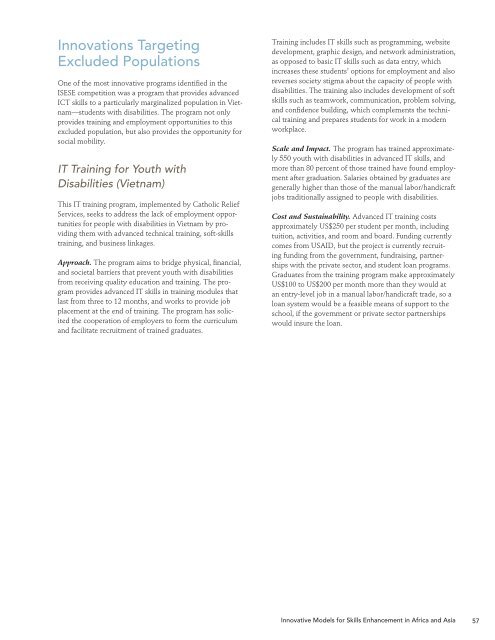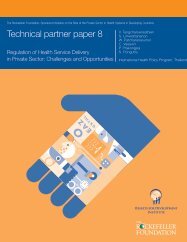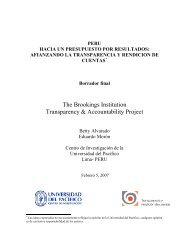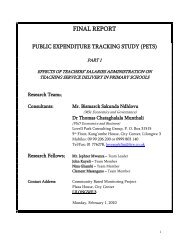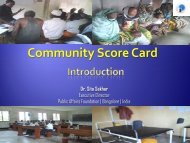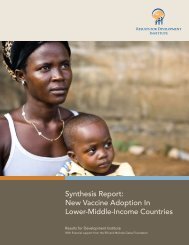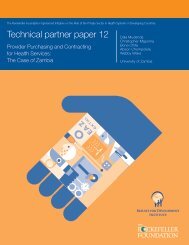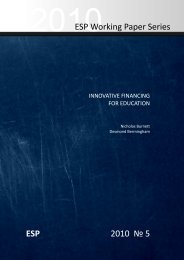Innovative Secondary Education For Skills Enhancement
Innovative Secondary Education For Skills Enhancement
Innovative Secondary Education For Skills Enhancement
Create successful ePaper yourself
Turn your PDF publications into a flip-book with our unique Google optimized e-Paper software.
Innovations Targeting<br />
Excluded Populations<br />
One of the most innovative programs identified in the<br />
ISESE competition was a program that provides advanced<br />
ICT skills to a particularly marginalized population in Vietnam—students<br />
with disabilities. The program not only<br />
provides training and employment opportunities to this<br />
excluded population, but also provides the opportunity for<br />
social mobility.<br />
IT Training for Youth with<br />
Disabilities (Vietnam)<br />
This IT training program, implemented by Catholic Relief<br />
Services, seeks to address the lack of employment opportunities<br />
for people with disabilities in Vietnam by providing<br />
them with advanced technical training, soft-skills<br />
training, and business linkages.<br />
Approach. The program aims to bridge physical, financial,<br />
and societal barriers that prevent youth with disabilities<br />
from receiving quality education and training. The program<br />
provides advanced IT skills in training modules that<br />
last from three to 12 months, and works to provide job<br />
placement at the end of training. The program has solicited<br />
the cooperation of employers to form the curriculum<br />
and facilitate recruitment of trained graduates.<br />
Training includes IT skills such as programming, website<br />
development, graphic design, and network administration,<br />
as opposed to basic IT skills such as data entry, which<br />
increases these students’ options for employment and also<br />
reverses society stigma about the capacity of people with<br />
disabilities. The training also includes development of soft<br />
skills such as teamwork, communication, problem solving,<br />
and confidence building, which complements the technical<br />
training and prepares students for work in a modern<br />
workplace.<br />
Scale and Impact. The program has trained approximately<br />
550 youth with disabilities in advanced IT skills, and<br />
more than 80 percent of those trained have found employment<br />
after graduation. Salaries obtained by graduates are<br />
generally higher than those of the manual labor/handicraft<br />
jobs traditionally assigned to people with disabilities.<br />
Cost and Sustainability. Advanced IT training costs<br />
approximately US$250 per student per month, including<br />
tuition, activities, and room and board. Funding currently<br />
comes from USAID, but the project is currently recruiting<br />
funding from the government, fundraising, partnerships<br />
with the private sector, and student loan programs.<br />
Graduates from the training program make approximately<br />
US$100 to US$200 per month more than they would at<br />
an entry-level job in a manual labor/handicraft trade, so a<br />
loan system would be a feasible means of support to the<br />
school, if the government or private sector partnerships<br />
would insure the loan.<br />
<strong>Innovative</strong> Models for <strong>Skills</strong> <strong>Enhancement</strong> in Africa and Asia 57


